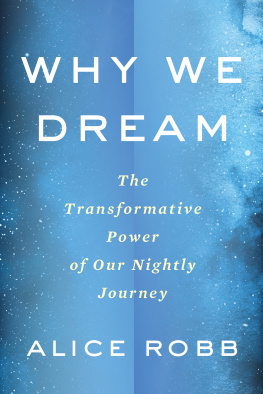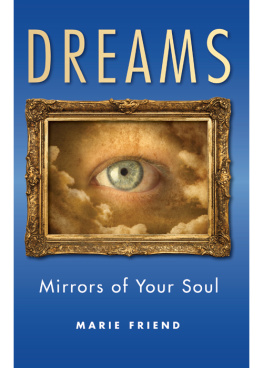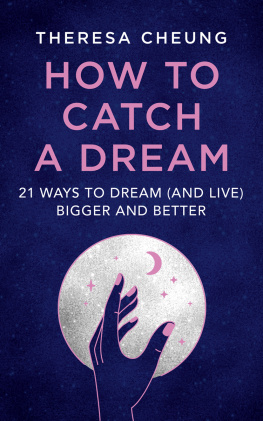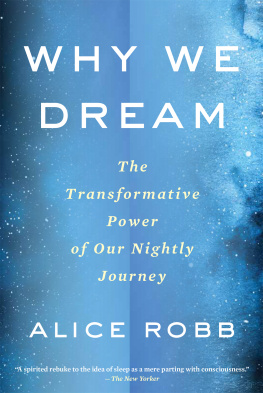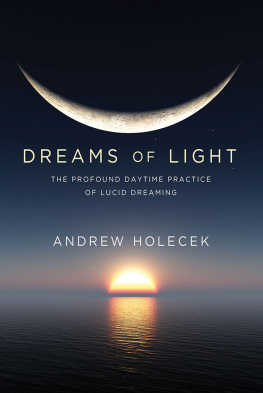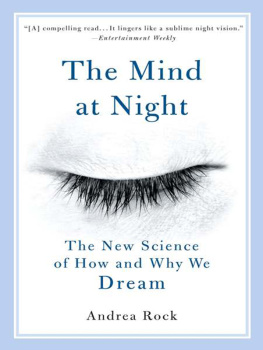Copyright 2018 by Alice Robb
All rights reserved
For information about permission to reproduce selections from this book, write to or to Permissions, Houghton Mifflin Harcourt Publishing Company, 3 Park Avenue, 19th Floor, New York, New York 10016.
hmhco.com
Library of Congress Cataloging-in-Publication Data is available.
ISBN 978-0-544-93121-3
Cover design by Brian Moore
Cover image Shutterstock
Author photograph Don Razniewski Photography
eISBN 978-0-544-93210-4
v1.1018
I understand why most people regard their dreams as of little importance. They are too light for them, and most people identify the serious with what has weight. Tears are serious; one can collect them in a jar. But a dream, like a smile, is pure air. Dreams, like smiles, fade rapidly.
But what if the face faded away, and the smile remained?
Susan Sontag, The Benefactor
Introduction
I spent the summer of 2011 digging holes and talking about my dreams. Within two weeks, I had blown through the novels Id taken to the remote Andean village of Nepea, where I was excavating Moche remains with my classmates and a Peruvian professor. Id saved most of my suitcase for bulky rain gear and emergency jars of peanut butter; I hadnt anticipated how much time Id have when my internet access was subject to the whims of an erratic caf owner. So when my friend James passed me a beat-up paperback whose cover showed a mans brain being penetrated by a ray of sunlight and a puff of clouds, I willed myself to set my skepticism aside.
As I scanned the table of contents, though, I couldnt help but roll my eyes at chapter titles like Life Is a Dream and Rehearsal for Living. I cringed at the list of exercises: the eerie-sounding twin bodies technique, the ludicrous dream lotus and flame technique, the ominous no body technique. Stephen LaBerges Exploring the World of Lucid Dreaming had all the trappings of a New Age self-help screed, but with the closest English-language bookstore a six-hour bus ride away, I started to read.
Proverbially, and undeniably, life is short, LaBerge wrote. To make matters worse, we must spend between a quarter and a half of our lives asleep. Most of us are in the habit of virtually sleepwalking through our dreams. We sleep, mindlessly, through many thousands of opportunities to be fully aware and alive. In what LaBerge called lucid dreams, a sleeping person could become aware that she was dreaming andwith a little practicecontrol the plot of the dream. I was hooked.
Most people experience a lucid dream at some point in their lives, but only about 10 to 20 percent have them regularly. For some in that minority, lucid dreaming is so pleasurable that it becomes a hobby or a kind of self-help. Lucid dreams can seem more vivid than reality; they can provide a high as intense as psychedelics and even deliver sexual gratification. (One psychologist claimed to reach orgasm in one-third of her lucid dreams, and measures of vaginal pulse amplitude have shown that womens dream orgasms correspond to real physiological changes.) Others use lucid dreaming to take control of nightmares or rehearse difficult real-life situations. Of all my memories of that summer in Perudrinking pisco in the desert, finding a mummified baby, unwrapping it under less-than-scientifically-optimal conditionsthe one that stands out most is the memory of my first lucid dream.
At nine oclock, I climbed into the bottom bunk and curled up in my sleeping bag, worn out from physical exertion and the monotony of digging. I set my alarm for five A.M. and drifted off almost immediately, my body too tired to let my mind wander down its usual anxiety-laden paths. And then, the scene changed. It was a summer afternoonnot the Andean summer, with its thin warmth and cloudy nights, but a real summer, the kind of heat so extravagant you jump in the water and dry off in the sun. I soaked up the warmth Id been craving, treading water in some bucolic pool Id never seen before. I dont particularly like swimming in real life; I dont like exercising in any form without the distraction of podcasts or Pandora. But this was differenteffortless and sensual. I had a heightened awareness of every part of my body, the physicality of the cool water and the bright air and a surreal forest enclosing the pool in magnificent foliage. I woke up euphoric.
The memory had none of the haziness that usually clouds dreams, and the details remain perfectly crisp years later. But I wasnt just elated; the whole thing was also vaguely disturbing. I hadnt been in my sleeping bag in a dusty dormitory in PeruI had been transported to some faraway place, and I preferred it there. My jaunt in the pool had shaken my sense of what was real, and I couldnt explain it without sounding crazy. All I knew was that I wanted to do it again.
James and I spent the rest of the summer practicing LaBerges tips. We recounted our previous nights dreams while we scratched the grime off ancient pots. We repeated LaBerges mantra ad nauseam: Tonight, I will have a lucid dream. We made up mantras of our own: Tonight, I will fly to the moon. We learned to recognize the signs that we were dreaming, like finding ourselves flying or meeting dead people. Every couple of hours, we would do what LaBerge called a reality test, asking ourselves if we were awake or asleepa trick that, once ingrained, LaBerge promised would trigger lucidity.
The bar for what constitutes good conversation may be lower when you spend most of your time scraping the sand with a trowel, but even after I left Peru, even when I had more than four people to talk to, high-speed WiFi, and whole libraries full of books, I couldnt stop thinking about dreams. They were so much fuller, so much more mysterious than I had ever imagined.
I began keeping a dream diary, carefully logging whatever I could remember of my dreams in a spiral-bound leather notebook each morning; I had read that it was important to record something every day, no matter how fragmented or boring. The results were almost immediate. Within weeks, the entries in my journal went from a dutiful No recollection or brief, tentative snippets (I am watching the Nutcracker? There is a spider?) to two or three long, convoluted narratives almost every night. My new night life was every bit as activeand at least as entertainingas my waking hours, and I was stunned: I understood that I had been having dreams like this all my life, but I had been promptly forgetting them, letting them fade away as though they had never happened. What adventures had I gone on and then forgotten? What opportunitiesto gain new insight or just to take a break from realityhad I missed?
Most new skillsespecially those that promise to change how you experience the worldare difficult to learn. Mastering a new language takes years of concentrated study. Meditating requires patience and frequent, sometimes frustrating practice. Gains are incremental, often imperceptible. But improving your dream life can be as simple as increasing the time you devote to thinking about dreams from none at all to a minute or two each day, sparing a pre-bed thought for your intention to remember your dreams or taking a moment to write them down or speak them into your smartphone in the morning. The process is painless; the progress is swift. And the payoff is life-changing. Becoming aware of your dreams is like dipping into a well of otherwise inaccessible fantasies and fears, signs from our subconscious and creative solutions to projects and problems.
I N RECENT YEARS, scientists have discovered how we can improve our dream recall and harness the power of dreams in a systematic fashion. But humans have been wondering about their dreams for millennia. Some scholars believe that our ancestors earliest artworkcave paintingswere inspired by their makers nighttime visions. Dream diaries are among the oldest examples of literature; they have been found in the remains of ancient Greece and medieval Japan.

